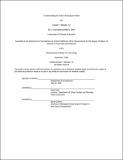Understanding the value of boutique hotels
Author(s)
Wheeler, Daniel F. (Daniel Fairchild)
DownloadFull printable version (1.927Mb)
Other Contributors
Massachusetts Institute of Technology. Dept. of Architecture.
Advisor
Peter Roth.
Terms of use
Metadata
Show full item recordAbstract
In recent decades, boutique hotels have witnessed a dramatic increase in popularity in the United States. The purpose of this paper is to provide the reader with an understanding of boutique hotel value and conditions that allow for boutique hotel success. First, it will provide a formal definition of boutique hotel, a definition which remains elusive despite the popularity of the hotel category. Second, it will provide a comparative analysis, based upon price-per-room paid by investors, of three different hotel categories: boutique, independent, and branded chain. In defining boutique hotel, the paper relies upon both written definitions and interviews with real estate developers and real estate brokers. The boutique hotel category is defined, and then contrasted with the definitions of independent hotels and branded chain hotels. In analyzing boutique hotel value, the paper considers hotels that have sold in the past five years in Boston, New York City, and Washington D.C. Price-per-room paid by investors for these hotels is compared across each of the three hotel categories, in each of the three cities. The paper analyzes the results of the value comparison of the different hotel categories. (cont.) In conjunction with such analysis and interviews, tourism data for each city is reviewed in an attempt to gain a deeper understanding of boutique hotels. In conclusion, the paper discusses conditions that allow for boutique hotel success, and potential cultural explanations for the boutique hotel movement. Potential shifts in American consumer interest are discussed, as well as the broader significance of the boutique hotel movement.
Description
Thesis (S.M.)--Massachusetts Institute of Technology, Dept. of Architecture, 2006. This electronic version was submitted by the student author. The certified thesis is available in the Institute Archives and Special Collections. Includes bibliographical references (leaf 39).
Date issued
2006Department
Massachusetts Institute of Technology. Department of ArchitecturePublisher
Massachusetts Institute of Technology
Keywords
Architecture.